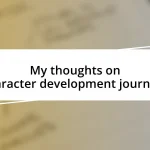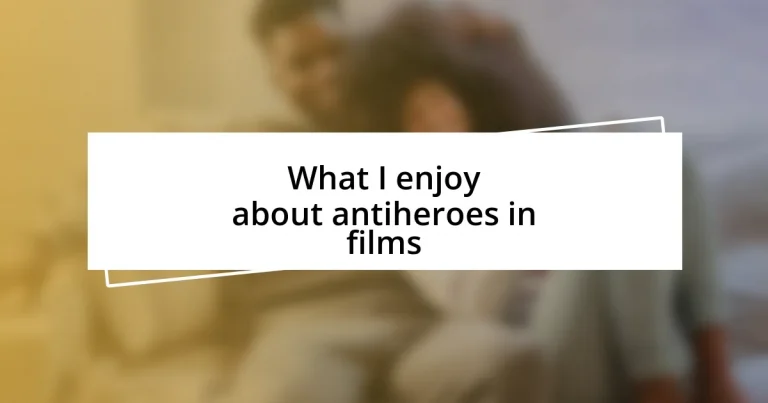Key takeaways:
- Antiheroes blur the lines between good and evil, making their moral complexity relatable and thought-provoking for viewers.
- Their internal conflicts and personal motives often resonate with audiences, reflecting shared human vulnerabilities.
- Antiheroes challenge societal norms and traditional heroism, prompting viewers to reevaluate their own beliefs and values.
- The emotional connection with antiheroes evokes a mix of empathy and discomfort, enriching the experience of understanding flawed characters.
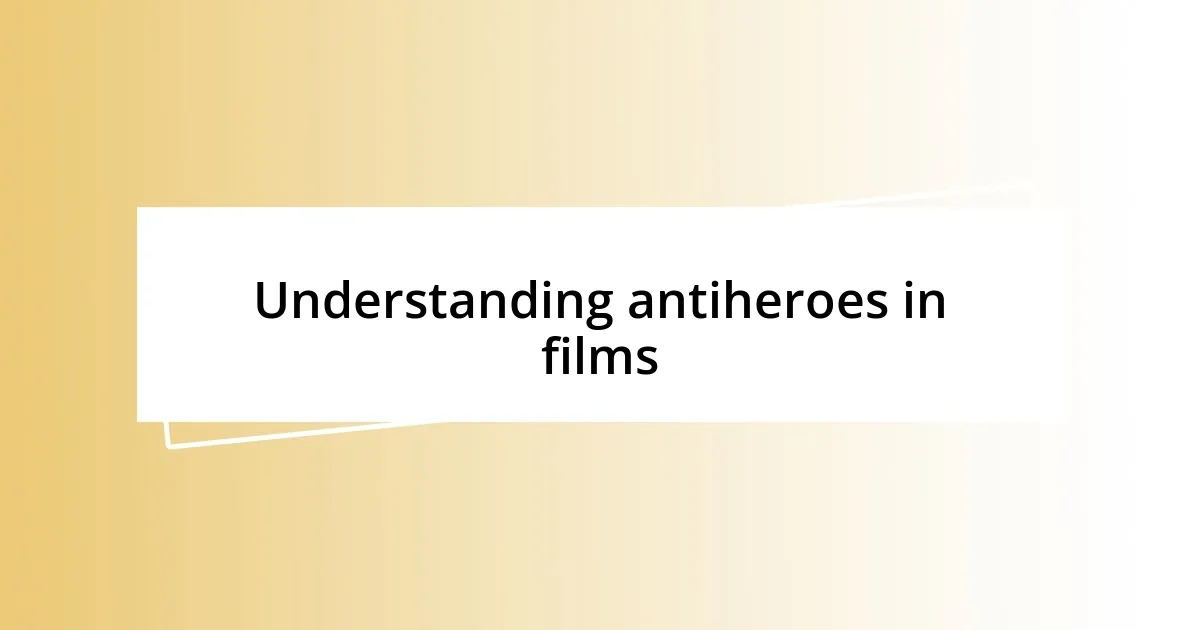
Understanding antiheroes in films
Antiheroes occupy a fascinating space in film narrative. They embody complexity and ambiguity, often blurring the lines between good and evil. I remember first watching a film where the antihero made decisions that left me conflicted yet intrigued. Isn’t it thrilling when characters make choices that force us to question our own moral boundaries?
These characters invite viewers into a deeper emotional experience. Their struggles often mirror our own, making their journeys relatable. Have you ever found yourself rooting for a character who you know is flawed? In those moments, I realized that I wasn’t just watching a story; I was reflecting on my own imperfections.
One of the most compelling aspects of antiheroes is how they confront societal norms. They challenge the status quo, allowing us to examine our beliefs and values. I often wonder if their rebellion sparks a sense of liberation within us as viewers. When I see them defy expectations, I am reminded that it’s okay to be imperfect and to embrace our own complexities.
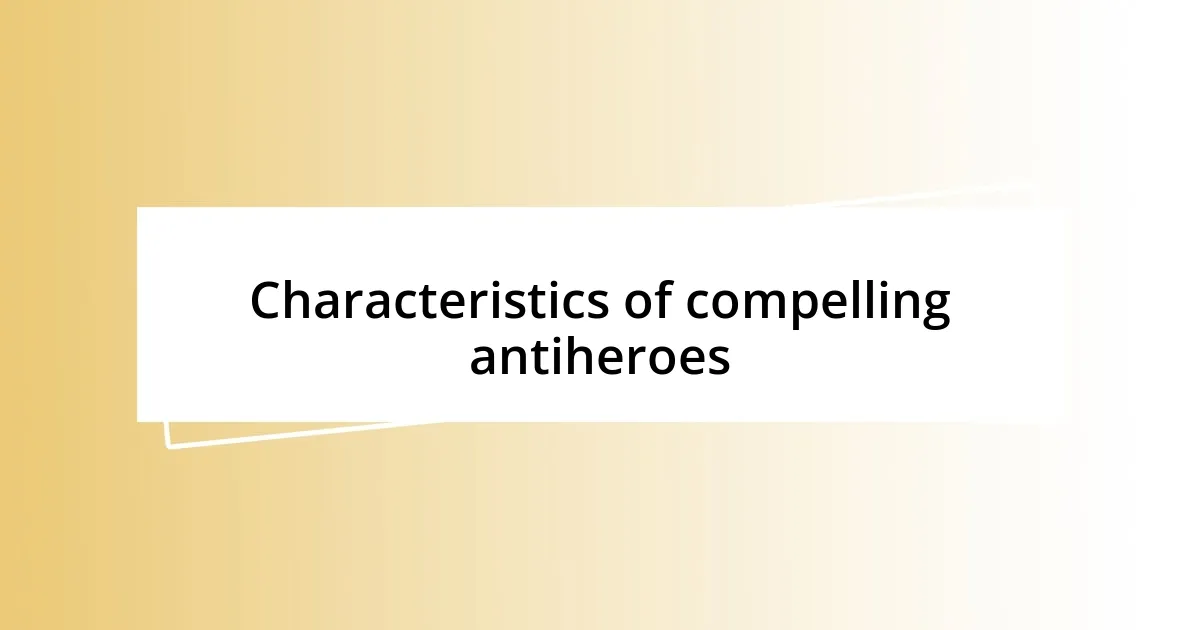
Characteristics of compelling antiheroes
Compelling antiheroes often showcase a deep internal conflict, wrestling with their motivations and actions. I think this struggle adds layers to their character, making them relatable—even if their choices are questionable. For instance, when I watched a film where the protagonist grappled with the moral implications of their deeds, I felt an unexpected connection as I reflected on my own conflicts.
Another key trait is their charm and charisma, which can sometimes overshadow their darker qualities. It’s fascinating how these characters can draw us in despite their flaws. I remember being completely captivated by an antihero whose magnetic personality made me overlook their troubling choices. That allure serves as a reminder that we are all multifaceted, just like these complex characters.
Finally, compelling antiheroes are often driven by personal motives that resonate deeply with audiences. Their backstories frequently reveal trauma or a desire for redemption, connecting with viewers on emotional levels. I recall a moment in a film where the antihero’s pain became palpable, and I found myself empathizing with their struggle just as I might in my own life. Such moments transcend entertainment; they are windows into the human experience.
| Characteristic | Explanation |
|---|---|
| Internal Conflict | They often struggle with their choices and motivations, making them relatable. |
| Charisma | Their charm can overshadow darker qualities, drawing viewers in. |
| Personal Motives | Motivations tied to personal pain or desires for redemption resonate with audiences. |
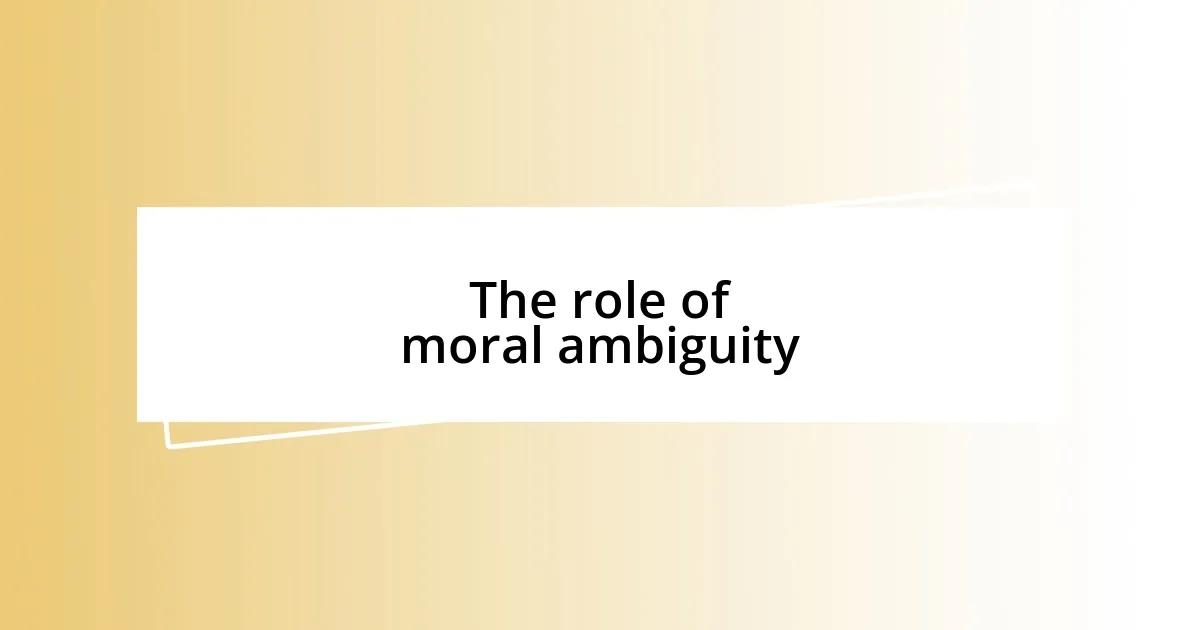
The role of moral ambiguity
Moral ambiguity is at the heart of what makes antiheroes so compelling. Watching characters navigate their flaws often forces me to evaluate my own understanding of right and wrong. I recall a film where the antihero’s seemingly selfish choice led to unexpected consequences that ultimately benefited others. This paradox created a tension that lingered with me long after the credits rolled.
- The complexity of their decisions reflects real-life dilemmas, encouraging empathy.
- It invites viewers to explore uncomfortable questions about morality.
- Their actions can challenge societal norms, offering a fresh perspective on ethics.
- Moral ambiguity allows for rich character development, creating suspense and intrigue.
By stepping into the shoes of these flawed individuals, I often find myself wrestling with the idea that life isn’t simply black and white. Antiheroes draw me into their morally complicated world, prompting me to reconsider my own values and the nuances of human behavior. It reminds me that, much like these characters, we all exist in shades of gray.
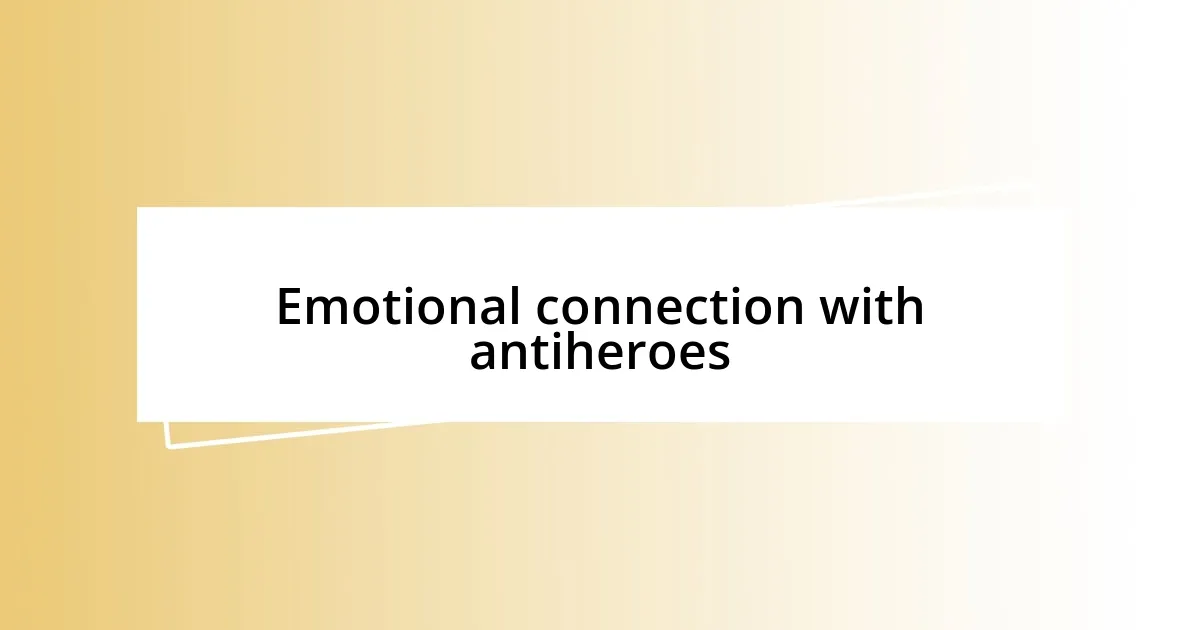
Emotional connection with antiheroes
The emotional connection I feel with antiheroes often stems from their raw vulnerability. There’s something deeply moving about witnessing their struggles and failures; it’s as if I’m seeing pieces of myself reflected in them. I remember a scene from a film where the antihero broke down after failing to protect someone they loved. I felt that heartache resonate within me, highlighting how even flawed characters experience profound pain.
What truly draws me in, however, is the sense of shared humanity I find in their stories. When they make questionable choices out of desperation, I can’t help but ponder: how would I react in a similar situation? I once watched a movie where an antihero was driven to extreme actions due to a tragic loss. That backstory made their turmoil palpable, and I couldn’t avoid feeling a connection to their grief. This complicity invites me to reflect on my own emotions and decisions.
It’s fascinating how antiheroes can evoke a mix of empathy and discomfort. On one hand, I feel for their plight; on the other, I grapple with my own judgments about their actions. There’s a film I hold dear where the antihero embodies this duality perfectly. Each time they made a cruel choice, I found myself asking whether I could forgive them, mirroring the internal dialogue I often have about my own imperfections. This blend of admiration and unease enriches my viewing experience, making it profoundly personal.
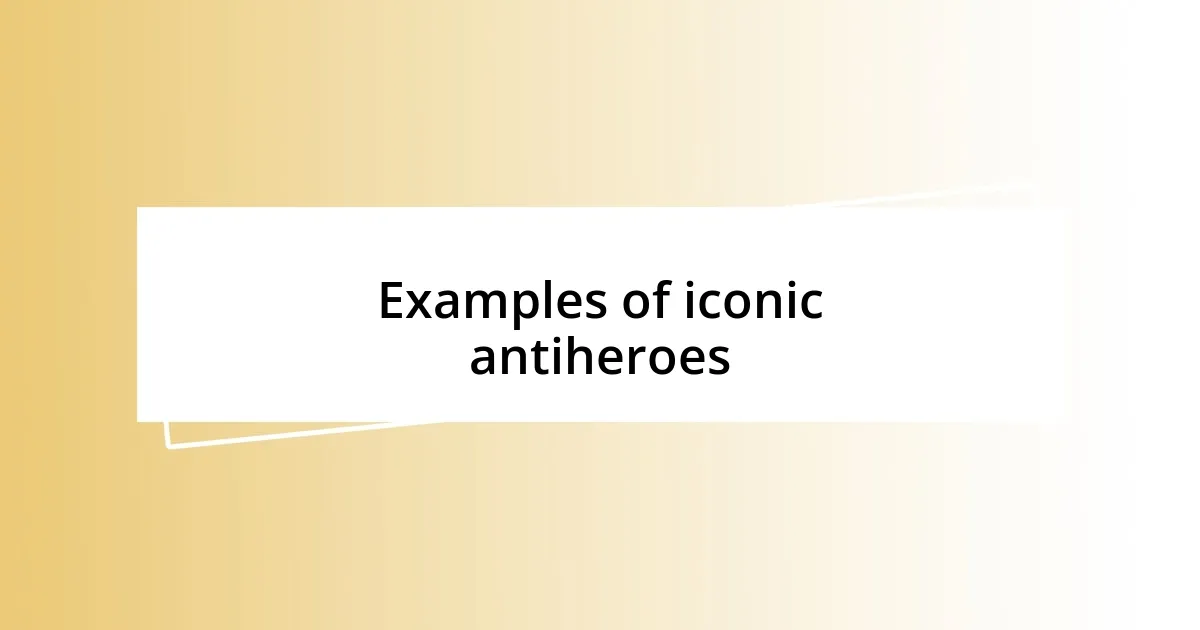
Examples of iconic antiheroes
When I think of iconic antiheroes, Walter White from Breaking Bad invariably comes to mind. His transformation from a mild-mannered chemistry teacher to a ruthless drug lord is fascinating. I remember the moment he first fully embraced his darker self; it sparked a mixture of admiration and horror within me. It made me ponder: how far would I go to provide for my family?
Then there’s the unforgettable character of Tony Soprano from The Sopranos. His ability to balance the roles of caring father and fiercely violent mob boss invites a captivating exploration of duality. I often reflect on how his struggles with anxiety and identity resonate with many of us, blurring the lines between villain and victim. Watching his vulnerability made me question my assumptions – could I ever sympathize with someone who so often embodies ruthlessness?
Another classic example is the charismatic antihero Jesse Pinkman, also from Breaking Bad. His journey from a small-time dealer trying to escape his past to someone deeply affected by guilt showcases a complicated soul. I feel that deep sense of loss when he grapples with the consequences of his actions. It’s this nuanced portrayal that compels me to root for him, despite the chaos he often creates. How does one reconcile their errors and seek redemption? Jesse certainly embodies the struggle of seeking forgiveness while battling one’s demons.
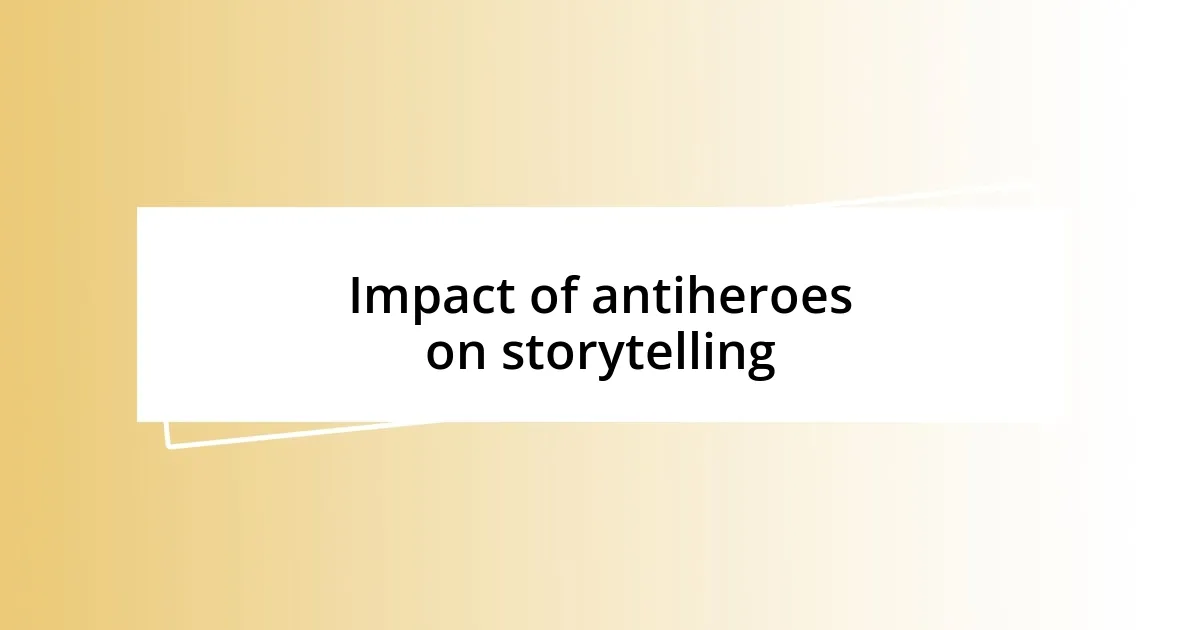
Impact of antiheroes on storytelling
The impact of antiheroes on storytelling is profound and multifaceted. They challenge traditional notions of heroism, engaging viewers with their moral complexities. I recall watching a film where the antihero’s flawed decisions led to unexpected consequences that shocked me. It made me grapple with the question: can a character’s flaws lead to greater narratives, or do they simply derail the story?
Moreover, antiheroes often serve as mirrors of our own imperfections. Their journeys can illuminate our dark sides, forcing me to confront my biases and judgments. There’s this gripping scene in another movie where the antihero faced a choice between selfishness and sacrifice. I found myself reflecting on how I might react under similar pressure. The way these characters embody our internal battles invites meaningful discourse about morality and redemption.
What’s truly captivating is how antiheroes make us question our understanding of right and wrong. I remember a conversation I had with a friend after watching a series finale featuring a morally ambiguous protagonist. We debated whether their final actions were justified or a betrayal of everything we believed in. This dialogue highlighted how antiheroes can spark engagement and debate, enriching the storytelling experience for both filmmakers and audiences alike.
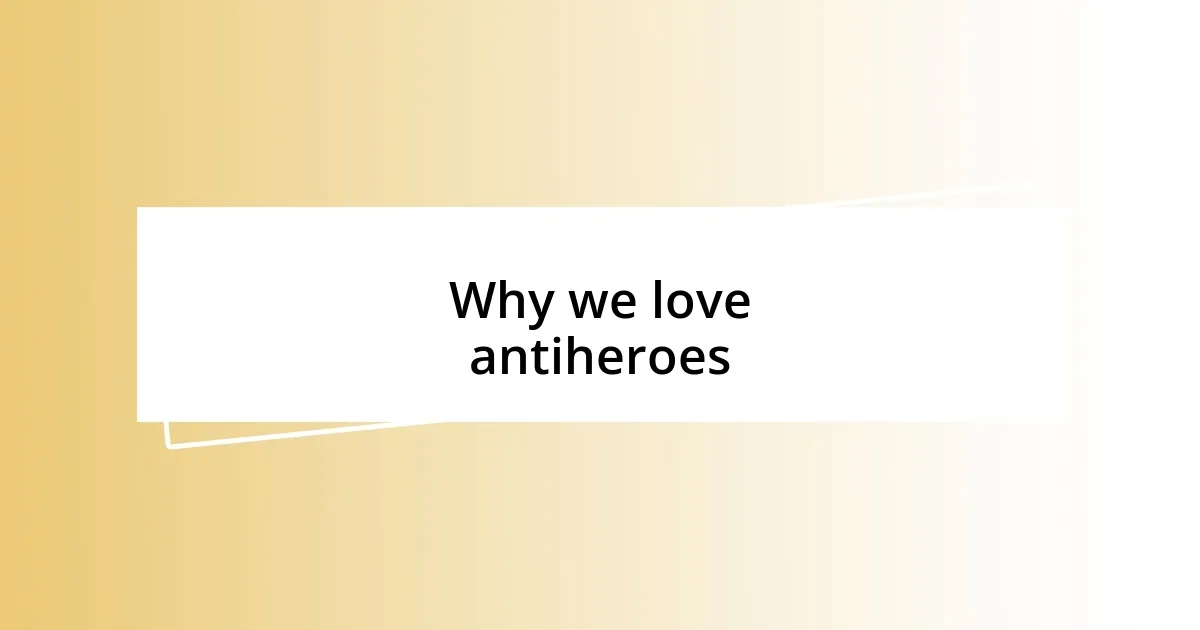
Why we love antiheroes
One reason we love antiheroes is their deep moral complexity. I remember watching a film where the protagonist made decisions that were undeniably wrong, yet I found myself surprisingly empathetic toward their plight. It made me wonder: what drives us to root for someone who is clearly flawed? Perhaps it’s the realization that their struggles reflect our own imperfections, drawing us closer to their humanity.
Additionally, antiheroes often challenge the status quo, making us reconsider what it means to be a hero. I often think back to an unexpected twist in a series where an antihero’s choices led not just to chaos but also to moments of profound insight. It left me asking myself: can a character’s descent into darkness illuminate the path to true understanding? For many viewers, that blurry line between good and evil resonates on a personal level, prompting self-reflection.
There’s something exhilarating about witnessing an antihero embrace their darker impulses. I vividly recall a scene where a character manipulated others for personal gain. Instead of feeling repulsion, I felt a thrill—a tug between admiration and horror that reminded me of life’s gray areas. It raises a fascinating question: is it the thrill of rebellion against societal norms that captivates us? This internal struggle, the balance of right and wrong, makes their stories all the more captivating and relatable.




